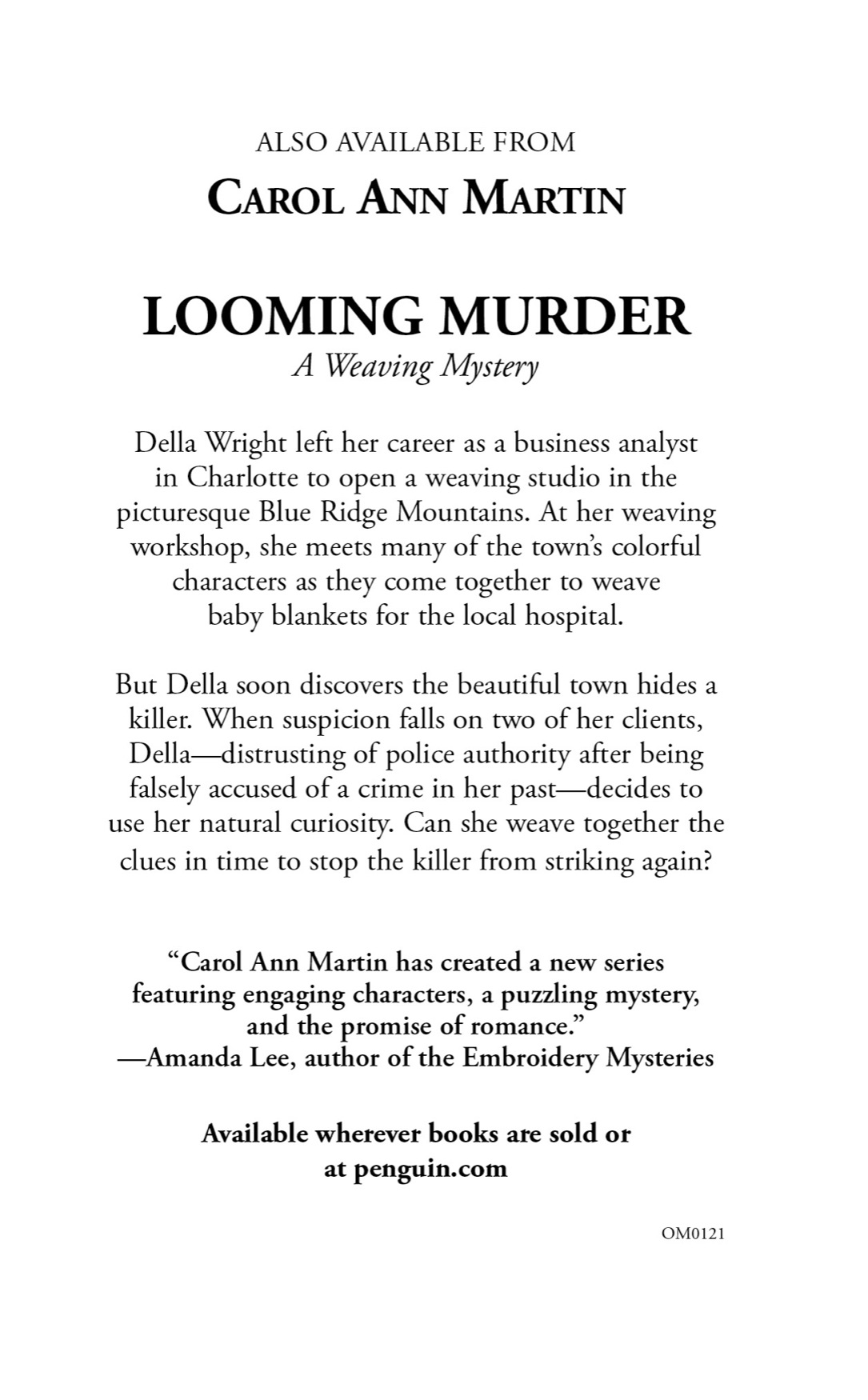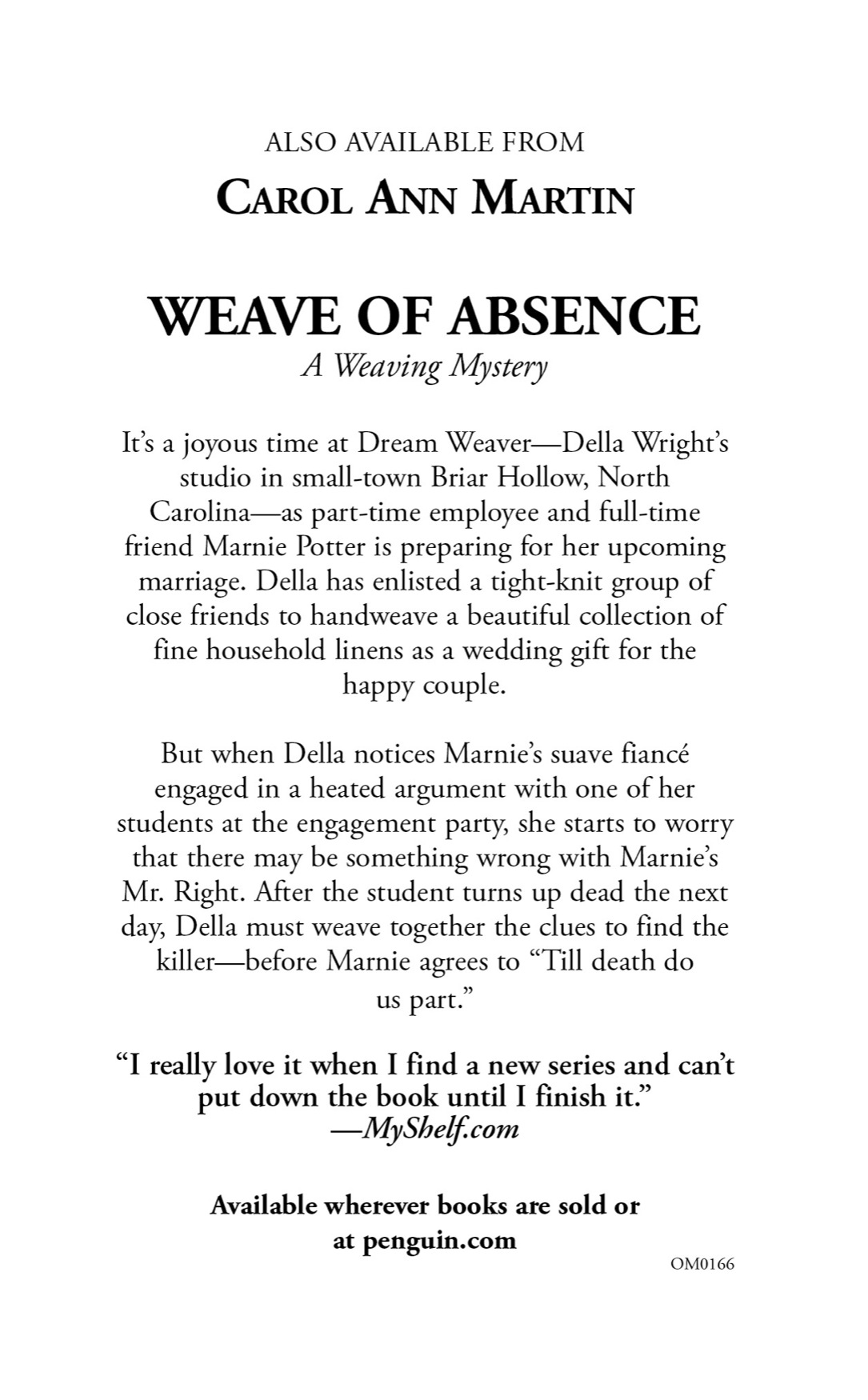Loom and Doom (23 page)
Authors: Carol Ann Martin

“Y
ou look beautiful,” Matthew said, holding the door open for me. I was wearing my blue dressâthe one I knew was his favoriteâand my highest heels. I'd done my hair and it now fell onto my shoulders in soft curls. And I'd paid particular attention to my makeup. As a result, I looked as good as I could, without looking like an entirely different person.
“Thank you,” I said. He went around the car, slipped into the driver's seat and we took off. Minutes later we walked into the Longview. Again, he went around and held the door open for me.
“Mademoiselle.”
“I always did have a weak spot for Frenchmen,” I said, sliding out. “You're being so formal tonight,” I said. “What's the occasion?”
“The occasion is you solving not one, but
two
cases. So your snoopingâ”
“Investigating,” I corrected him, keeping my tone light, even though my heart had just dropped like a brick. If the whole point of the evening was to celebrate my solving the case, I might as well go home.
“Fine. Investigating,” he repeated after me. “The point is you're alive and I don't have to worry about you getting into trouble. I don't know about you, but that, to me, is worth celebrating.”
“Hi, Della. Hi, Matthew,” Bunny, the owner, said from behind the registration desk. “Everything is ready for you,” she added with a wide smile. She waved us toward the restaurant entrance with a grand gesture, worthy of a
The Price is Right
model.
“Wow. What was that all about?” I asked as soon as we had walked out of earshot. “It's not like we've never been here before.”
“Who knows?” Matthew said, opening the restaurant door.
“What the heck?” The inside of the restaurant was pitch-black. Suddenly the lights went on and people were jumping out from all over the room. I spotted Jenny and her boyfriend, Ed. A few feet away were Marnie and my mother. “What the heck?” I said again, dumbfounded.
“Surprise!” they all yelled at once, almost sending me into cardiac arrest.
“Whatâ” I looked at Matthew, confused.
“This was your mother's idea,” Matthew said, grinning wickedly. “And I decided it was an excellent idea.”
People were now standing around, waiting for God knows what. I looked among the crowd seeing more people I knew. There was Margaret, and Mercedes with her mother. Even Roxanne was here, and at least a dozen other people. And then my mother was coming forward with her arms open. She wrapped me in a bear of a hug.
“Surprise, sweetheart.”
“But . . . It's not even my birthday,” I said when she released me. “I don't understand.” Rather than answer, she just smiled and pointed to Matthew. I turned toward him, and to my surprise, found him on one knee.
All at once, tears gathered in my eyes.
“Della,” he said, retrieving a small silver box from his pocket, and opening it. “Will you do me the honor of becoming my wife?”
This was the moment I had dreamed of for so long. But when I opened my mouth to say yes, it came out like a croak, and in the next moment I had rivers running down my cheeks.
Everybody I knew was watching as my makeup was quickly becoming ruined. My nose was running. And I just knew I was doing the ugly cry. But I had never been so happy in my life.
“Was that a yes?” Matthew asked.
I nodded. As he slipped his grandmother's ring on my finger, the whole room broke into applause.
Weaving Tips
N
avajo weaving is easily recognized for its bright geometrical patterns in reds, blues, yellows and greens, often on tan or gray backgrounds. Although originally it was used to create blankets and little else, today we find it in everything from rugs, and upholstery fabrics, and home linens such as place mats and decorator cushions, and yes, even in fashion. A few of my favorite projects were sleeveless vests (worn over a shirt and jeans) and a shoulder bag.
What most people don't know is that the original Navajo designs were simple stripes of white, gray and brown. In the early seventeenth century, few Native cloths contained blue. The blue pigment, indigo, could be obtained only through trade with Mexico and was difficult to come by. It wasn't until the mid-nineteenth century that many of the colors we now associate with Native weaving actually came into popularity.
One important characteristic of Navajo weaving is that it is constructed wide rather than long. This is because traditional Navajo weaving used upright looms with no moving parts. Often they were simply two trees six to eight feet apart, and the weft was prepared by simply wrapping the yarn around from one tree to the other, again and again, until the desired length was reached. And then the weaver would work on the project until it was finished. The artisan sat on the ground during weaving and wrapped the finished portion of fabric underneath the loom as it grew. The average weaver took anywhere from two months to many years to finish a single rug, depending on the size of the project.
Another characteristic of Navajo weaving is in the threads used. Historically, the Navajos raised their own sheep, and produced their own wool, which was coarser than most seen today. For a more traditional look, use natural 8/4 wool yarn.
Before starting on your project, I recommend always making a sample. Simply use an empty frame and wrap your weft around and around until you have the desired width. Aim for five threads per inch. This should be perfect for the recommended thickness of yarn. Remember that the more yarns per inch, the finer your thread will need to be and the more challenging your project. For the first time, I also recommend a simple stripe pattern, working with three colors, off-white, gray and red, for example. It will result in a pleasing yet easy project. A first-timer's biggest challenge is usually in beating the weft evenly so that the rows and stripes are straight.
Although there are Navajo looms available on the market, you can always start with a small project, such as the decorator cushions I mentioned earlier, and use the proverbial frame loom with the wraparound technique I described above. Once you've mastered that, you can move on to bigger projects.
Happy weaving, everyone!
About the Author
Carol Ann Martin
is an author and former television personality who divides her time between San Diego and the Canadian coast. She lives with her husband and their ever-expanding collection of dogs. When she is not writing, Carol Ann enjoys baking and beekeeping.



Looking for more?
Visit Penguin.com for more about this author and a complete list of their books.
Discover your next great read!
